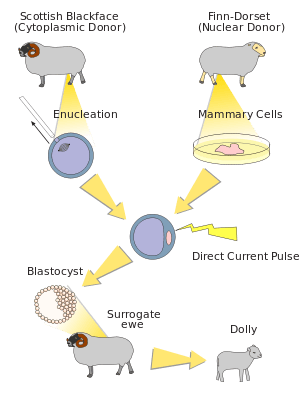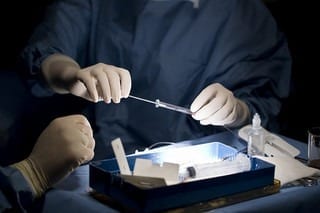
People with conditions such as heart disease or Parkinson’s could benefit from tissue grown with their own DNA
Lorraine Barnes suffered a heart attack in 2005 and has lived with the consequences – extreme exhaustion and breathlessness – ever since. “I was separated from my husband and so my children, Charlotte and James, had to grow up overnight because suddenly they were caring for me,” she says.
Charlotte agrees: “It turns your world upside down. I worry about my mum day and night, 24/7.”
Heart failure leaves Barnes, 49, “drowning and gasping for air”, she says. What really preys on her mind, though, is not her present difficulty but her future. “It scares me, as obviously I want to be around to see my children grow up.”
There is no cure for heart failure, the aftermath of a heart attack, and the condition is common. Every seven minutes a person has a heart attack in the UK, and some victims are left so weakened they can hardly walk a few metres.
It’s a grim scenario. But the prospects for patients like Barnes last week took a dramatic turn for the better when it was revealed that human cloning has been used for the first time to create embryonic stem cells from which new tissue – genetically identical to a patient’s own cells – could be grown.
Scientists have been working on such techniques (see box) for some time but their work has been hampered by the difficulties involved in cloning human cells in the laboratory. But the team led by Shoukhrat Mitalipov, of the Oregon Health and Science University in Portland, got around this problem. By adding caffeine to cell cultures, their outputs were transformed. “We were able to produce one embryonic stem cell line using just two human eggs, which would make this approach practical for widespread therapeutic use,” said Mitalipov.
The development was hailed as a major boost for patients such as Barnes, who might benefit from tissue transplants – and not just heart attack patients but those suffering from diabetes, Parkinson’s disease and other conditions.
But the announcement was also greeted with horror. “Scientists have finally delivered the baby that would-be human cloners have been waiting for: a method for reliably creating cloned human embryos,” said David King of Human Genetics Alert. “It is imperative we create an international ban on human cloning before any more research like this takes place. It is irresponsible in the extreme to have published this.”
Several tabloid newspapers also carried banner headlines warning of the human cloning “danger”. Such reactions have a familiar ring. When the cloning of Dolly the Sheep was revealed in 1997 there was an outpouring of hysteria about the prospect of multiple Saddam Husseins being created in laboratories.
“At the time the chances of these horrors occurring – when scientists had not even created a single clone of a human cell – were remote,” said physiologist Professor Colin Blakemore of Oxford University. “Not that this worried the alarmists. The crucial point is that we should have spent the intervening time thinking about how we should react sensibly to the concept of a human clone when it does become possible. We have not done that and, although the science is still far off, it is getting closer. We need to ask, carefully and calmly: under what circumstances would we tolerate the creation of a human clone?”
At present such a creation is banned in Britain. No human embryo created by cloning techniques is allowed to develop beyond 14 days. “The research is very tightly regulated and I think there is little chance of a rogue laboratory creating a human clone,” said James Lawford Davies, a lawyer who specialises in health sciences. “However, many US states which, ironically, banned therapeutic cloning work because of their strong anti-abortion stances have laws that would permit human clones to develop into foetuses.”
Experts such as Professor John Harris, director of Manchester University‘s Institute for Science, Ethics and Innovation, see positive benefits in reproductive cloning which could have a place in society. He said: “If you take a healthy adult’s DNA and use it to create a new person – by cloning – you are essentially using a tried and tested genome, one that has worked well for several decades for the donor. By contrast, a child born naturally has an 8% chance of succumbing to a serious genetic abnormality because of the random selection of their DNA. You can avoid that with a clone.”
The Latest Bing News on:
Human cloning
- Scientists use cloning technology to revive endangered species: 'Conservationists have worked very hard to bring them back'on April 30, 2024 at 5:00 pm
The U.S. Fish and Wildlife Service, biotechnology nonprofit Revive & Restore, and the San Diego Zoo Wildlife Alliance are collaborating to revive the black-footed ferret population using cloning ...
- AI Newson April 30, 2024 at 10:16 am
Find in-depth AI news from Engadget's experienced editorial team. We cover all the latest artificial intelligence advancements including AI chatbots, LLMs, AI image generation, AI voice generation and ...
- Everything You Need to Know About AI Detectors for ChatGPTon April 30, 2024 at 4:00 am
If you find yourself wondering whether something is written by an actual human versus generated by AI, you're not alone. These detection tools can help you tell the difference.
- OPINION: An open door to science fiction in Mississippion April 29, 2024 at 12:51 pm
Earlier this session, controversy erupted over House Bill 1688, sponsored by Representative Missy McGee (R- Hattiesburg) and pitched as a move to “protect IVF access.” The marketing ploy that HB 1688 ...
- Enhancing Cybersecurity Defenses: The role of Voice Cloning in Penetration Testingon April 26, 2024 at 2:00 am
By Alex Serdiuk, CEO, Respeecher Newer and more impactful technological advancements are making the quest for foolproof cybersecurity measures more critical than ever. As organizations are doing ...
- Solving academic medical centers’ existential crisison April 26, 2024 at 1:30 am
It's a "Sputnik moment" for academical medical centers. Other countries are making large investments in medical research and infrastructure. The U.S. needs to do the same.
- AI expert discusses concerns of voice cloning after arrest of Baltimore County athletics directoron April 25, 2024 at 2:46 pm
An artificial intelligence expert spoke with WJZ about AI-generated voice cloning and how concerned you should be about having your voice cloned without your permission.
- Baltimore coach accused of using AI voice cloning to try to get a high school principal firedon April 25, 2024 at 1:59 pm
A former athletic director of a Baltimore high school has been arrested and charged with using an AI voice cloning service to frame the school’s principal.
- School athletic director arrested for framing principal using AI voice synthesison April 25, 2024 at 8:31 am
Baltimore County Police arrested Pikesville High School's former athletic director, Dazhon Darien, and charged him with using AI to impersonate Principal Eric Eiswert, according to a report by The ...
- Medicaid should cover donor breast milk for vulnerable infantson April 18, 2024 at 1:30 am
Expanding Medicaid coverage of donor breast milk would save lives. Research shows it would also save taxpayers up to $60 million a year.
The Latest Google Headlines on:
Human cloning
[google_news title=”” keyword=”Human cloning” num_posts=”10″ blurb_length=”0″ show_thumb=”left”]
The Latest Bing News on:
Reproductive cloning
- Scientists use cloning technology to revive endangered species: 'Conservationists have worked very hard to bring them back'on April 30, 2024 at 6:00 pm
"It's basically the raw material of adaptive evolution." Scientists use cloning technology to revive endangered species: 'Conservationists have worked very hard to bring them back' first appeared on ...
- 2 Georgia Tech Faculty Members Named AAAS Fellowson April 27, 2024 at 5:00 pm
Aaron Levine and Susan Margulies have been named fellows of the American Association for the Advancement of Science, the world’s largest multidisciplinary scientific society.
- Solving academic medical centers’ existential crisison April 26, 2024 at 1:30 am
It's a "Sputnik moment" for academical medical centers. Other countries are making large investments in medical research and infrastructure. The U.S. needs to do the same.
- 2 More Endangered Ferrets Have Been Cloned from Critter Frozen in the 1980son April 18, 2024 at 10:37 am
Two new black-footed ferret clones have been born over three years after a black-footed ferret became the first-ever endangered U.S. species to be cloned — and they used the same genetic material as ...
- Two endangered black-footed ferrets cloned from frozen tissue sampleson April 18, 2024 at 10:22 am
Noreen and Antonia, born last May, are among first cloned offspring of a native endangered species in the North America ...
- Aaron Levine Named a Fellow of the American Association for the Advancement of Scienceon April 18, 2024 at 8:29 am
Aaron Levine, associate dean for research and outreach in the Ivan Allen College of Liberal Arts, has been named a fellow of the American Association for the Advancement of Science (AAAS), the world’s ...
- Two female ferrets, Noreen and Antonia, are latest clones of frozen 1980s critteron April 18, 2024 at 7:15 am
Black-footed ferrets were thought extinct until a Wyoming ranch dog found one in 1981.
- Practicing medicine at a predominantly Black institution gave me the gift I didn’t realize I neededon April 18, 2024 at 6:45 am
As I care for patients at my health center, I can be my full, authentic, un-code-switched self. It's the gift I didn't realize how much I needed.
- 2 more endangered ferrets cloned from animal frozen in the 1980s: "Science takes time"on April 18, 2024 at 5:00 am
Two more black-footed ferrets have been cloned from the genes used for the first clone of an endangered species in the U.S., bringing to three the number of slinky predators genetically identical to ...
- Two more endangered ferrets are gene copies of critter frozen in 1980son April 17, 2024 at 6:29 am
Elizabeth Ann still lives at the National Black-footed Ferret Conservation Center in Fort Collins, Colorado, but she's been unable to breed, due to a reproductive organ issue ... Szuszwalak wrote.
The Latest Google Headlines on:
Reproductive cloning
[google_news title=”” keyword=”reproductive cloning” num_posts=”10″ blurb_length=”0″ show_thumb=”left”]











